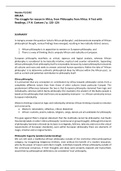Module PLS1502
ORUKA
The struggle for reason in Africa, from Philosophy from Africa: A Text with
Readings, / P.H. Coetzee / p. 120 -124
SUMMARRY
In trying to answer the question ‘what is African philosophy’, and demonstrate examples of African
philosophical thought, various findings have emerged, resulting in two radically distinct senses;
1. African philosophy is in opposition to western or European philosophy, and
2. There is a way of thinking that is uniquely African and radically un-European.
European philosophy manifests as critical, rigorous and logical analysis, whereas African
philosophy is considered to be basically intuitive, mystical and counter rationalistic. Separating
African philosophy from philosophy itself is not possible, because by nature philosophy transcends
all cultures and races and seeks to answer universal human questions. Rather the idea of ‘African
philosophy’ is to determine authentic philosophical ideas by Africans within the African past, as
well as current and potential contribution to philosophy itself.
Ethno-philosophy:
It is presumed that any conception or contribution by Africa towards philosophy comes from a
completely different nature than from those of other cultures (most particular Europe). The
predominant differences between the two is that European philosophy stemmed from logic and
individuality, whereas within Bantu philosophy (for example), the wisdom of the Bantu people is
based on the philosophy that vital forces are accepted by everyone – i.e. African community versus
European individuality.
Western thinking is based on logic and individuality whereas African thinking is based on emotion
and community.
• Western: rationalistic, reflective, critical, dialectical
• African: customs, poems, taboos, religions, songs, dances are all candidates for philosophy
This goes against Plato’s original statement that the multitude cannot be philosophic, but Paulin
Hountondji labels it rather ‘ethno-philosophy’ (communal or group thought). Although this branch
of philosophy has been criticised (as its basis is on legends, folk lore, tales etc and not on the critical
requirements of European standards), even within European philosophy there are elements of
magic, emotive and un-logical factors.
Philosophic Sagacity (wisdom/understanding):
We can still seek a traditional African philosophy outside of the restrictive ethno-philosophical
category, by recognising indigenous thinkers, even without the benefit of a modern education,
who by the power of reason and inborn insight, contribute towards African philosophy outside of
the communal consensus. If their thoughts and ideas were properly exposed and transcribed,
would then by philosophical definitions, be considered ‘true’ philosophy.




